- Home
- Peter Ackroyd
Revolution, a History of England, Volume 4 Page 7
Revolution, a History of England, Volume 4 Read online
Page 7
In fact the treaty of Union was able to establish the largest free trade area in the world, and the manifest disadvantages of Scottish industry and agriculture were gradually removed.
Many of the Scottish people, however, were not so happy at the prospect of this arranged marriage. They had no wish to tie themselves to a richer and more powerful state, with all the dangers of being swallowed alive and becoming a Celtic appanage of the English Crown like Cornwall. Why should they turn their backs upon the old Stuart dynasty?
Nevertheless the various Acts of the ‘treaty of Union’ were passed by the beginning of May 1707, thus incorporating two nations or what Jonathan Swift called ‘our crazy double-bottomed realm’. In effect the treaty created a single sovereignty between the two nations and a single parliament, including Scottish representatives, but it also preserved the Kirk, Scottish law and Scottish local administration. From this time forward England, Scotland and Wales were united under the title of Great Britain.
The new flag, incorporating the red cross of St George and the white saltire of St Andrew, was popularly known as ‘The Union’ but it would of course make little difference to the war now being fought under its auspices. The success of Blenheim had been succeeded by little but disappointment and division among the allies, with neither Italy nor the Netherlands rescued from the French. The duke of Marlborough wished to invade France, and thus cut off the bull at the neck, but his fellow combatants gave him little, if any, support. They were too faint-hearted, and in any case too eager to defend their own territories.
Marlborough returned to the grim warfare in the Spanish Netherlands and, with the assistance of his Dutch and Danish allies, did manage to command a great victory at Ramillies in the spring of 1706. The French commander, Marshal Villars, described it as ‘the most shameful, humiliating and disastrous of routs’. As a result of the total defeat of their army the French withdrew from the Spanish Netherlands and abandoned a number of key towns; they retreated from Antwerp and Ostend, Bruges and Ghent and Lille.
The Bourbons were now in general disarray throughout their European possessions; an exception, perhaps, could be made for the Bourbon dynasty in Madrid that still held power through Louis’s grandson, Philip V, who remained the king of Spain for virtually forty years after a brief abdication in favour of his son. But now all seemed to be going well for the English and their allies. The capture of Lille in particular promised the key to Paris, and as a result Louis sent an envoy to The Hague for clandestine negotiations.
But the atmosphere in the English camp was not conducive to a treaty. Marlborough wrote to a Dutch general that ‘I am one of those who believe that France is not yet reduced to her just bounds, and that nothing can be more hurtful to us on this occasion than seeming overforward to clap up a hasty peace’. So the terms of any treaty were to be formidable. The least of them included the formal recognition of Queen Anne as legitimate sovereign in contrast to the spurious authority of the ‘Old Pretender’ who in the spring of 1708 added disaster to misfortune with a botched landing at the Firth of Forth; the proposed terms also included the demolition of the port at Dunkirk and the recall of Philip V from Madrid.
Louis XIV seemed prepared to yield all, or almost all. France and England had just suffered the coldest winters in living memory; the Thames became a Frost Fair and Lady Wentworth wrote to her brother of ‘post-boys being brought in by their horses to their stages froze to their horses stone dead’. Yet the bitter cold had more severely affected France, already afflicted as it was by famine, shortages and a general sense of failure.
Louis would go so far and no further. He could never sign the thirty-seventh article of the proposed peace which demanded that he remove his grandson from Madrid, by force if necessary, and replace him with the Habsburg Charles. It was an insult. To eject a member of his Bourbon house by arms, in favour of a Habsburg? It could never be. It is possible, even plausible, that Marlborough and his English negotiators made these demands precisely in order that Louis would refuse them and thus continue the conflict. The spoils of war were still very great, especially for a noble leader such as Marlborough. The duke had even asked the queen to confer upon him the title of captain-general for life, but Anne wisely rejected this as unconstitutional. Still, he had done sufficiently well. Blenheim Palace and Marlborough House were only two of the stone baubles he had collected.
The wealth and eminence of Marlborough were of course resented by those who opposed both him and the war itself; anger and frustration were also directed at the dominant Whig administration that held the purse-strings of the revenue. The Whig financiers were in any case growing rich on the loans they made to the administration, while the Tory squires were paying for government borrowing with heavy land taxes. The equation was not as simple as this, but this was how it appeared at the time. Nothing could be more onerous or more unfair. The Tories opposed the war on grounds of strategy as well as expense. Why fight on behalf of the Dutch who had for centuries been the great trade rivals of England? Why fight obscure battles on the continental mainland when nothing seemed to be gained from them?
The crisis in fact came with the battle of Malplaquet, south-west of Mons, in the early autumn of 1709. The English army and its allies won a paper victory at enormous cost, suffering double the enemy’s number of fatalities. The French withdrew in good order, while the English left more than 20,000 corpses on a battlefield that quickly became known as ‘the bloodiest in Europe’. Queen Anne sent no letter of congratulation to the duke. If the French could still fight in so spirited and determined a fashion, despite imminent projections of their collapse, who could foresee the end of war? The Tories called out against the carnage incurred, if not devised, by the Whig administration. Marshal de Villars, the commander of the French forces, wrote to the king that ‘if it please God to give your majesty’s enemies another such victory, they are ruined’. The original quote came from Pyrrhus, who was of course the father of the Pyrrhic victory.
The Whigs had now another enemy of quite a different type. Dr Henry Sacheverell, Fellow of Magdalen College, Oxford, had already alienated the Whigs by his fervent high church tendencies. With the assistance of a high Tory lord mayor, however, and some fellow travellers he was chosen to preach before the City corporation at St Paul’s Cathedral on the signal occasion of 5 November 1709. He was known to be an orator with few rivals on the religious stage. ‘He came into the pulpit,’ William Bissett wrote in The Modern Fanatic (1710), ‘like a Sybil to the mouth of her cave, or a pythoness upon her tripod, with such an air of fierceness and rage, as is not possible to express.’ With pursed lips and keen ferocious glare, he had all the appearance of a martinet. He was not learned but he was authoritative; he was not clever but he was persuasive. He was one of those clerics who can repeat the clichés of the age as if they were written in letters of fire.
His sermon was entitled ‘The Perils of False Brethren, in Church and State’. The ‘false brethren’ were not difficult to identify; in fact they were displayed by Sacheverell like so many puppets on poles. His attack was upon religious nonconformists, in particular the dissenting brethren whom the Whigs sought to protect and who had been granted freedom of worship by the Act of Toleration twenty years before. They had been chosen, according to the preacher, to rule a land of ungodliness and licence. In a previous sermon, delivered in 1702, he had declared that ‘presbytery and republicanism go hand in hand’, by which he meant that the levelling principle of nonconformity could be applied to politics as well as to religion. It was the old argument, adumbrated by James I in his remark of ‘no bishop, no king’.
But Sacheverell now proclaimed it with unparalleled ferocity. He launched into a tirade against religious toleration. He practically accused the dissenters of being regicides. He advocated to the utmost the principle of ‘passive obedience’ by which the sovereign must be implicitly obeyed; any dissent should be treated as sinful and as unlawful. This could of course be considered to be an implied criti
cism of the Glorious Revolution that had removed James II from the throne, but more immediately it could be construed by some as a momentous attack upon the Whig cause and its advocates.
The Whigs were at this moment in an unenviable position, beset by the enemies of the continental war and by their opponents whispering in the queen’s ear that all was not well in the state. In these circumstances, the best mode of defence was considered to be attack. It was decided, against the advice of Anne herself, that the doctor should be brought before the Commons to explain himself. In the middle of December the Commons condemned his statements as ‘malicious, scandalous and seditious libels’; he was placed in custody and impeached for ‘high crimes and misdemeanours’, for which he could be sentenced to life imprisonment.
The threat of the sledgehammer, raised against a relatively small nut, confirmed all the public suspicions concerning an over-mighty Whig administration intent upon preserving its own interests. What had Henry Sacheverell done but proclaim his loyalty to the established Church and to cry out that its privileges were being violated? What was the high crime in being a staunch Anglican? Those who attacked him, indeed, might themselves fall under the suspicion of subversion.
It is a matter of some interest that the ‘mob’, or the ‘rabble’, or whatever other word covered the ordinarily unremarked inhabitants of London, was traditionalist; the people were by instinct loyal to the established authorities of monarchy and religion, and any cry of ‘the Church in danger’ could bring them out onto the streets. They might never have attended an Anglican service in their lives but the threat against the Church was enough to rouse them.
As the time for the trial of Sacheverell approached, the London crowds gathered with the aim of sacking the meeting houses of dissenters; the dwelling houses of certain nonconformist ministers were also ransacked, the books and furniture destroyed. The pulpits and pews, even the wainscot, of several conventicles were brought to Lincoln’s Inn Fields where they were burned on a pile to the shouts of ‘High Church and Sacheverell!’ The carriage of the queen herself was stopped while the people cried out ‘God save your Majesty and the Church! We hope your Majesty is for Doctor Sacheverell!’ Daniel Defoe wrote that ‘the women lay aside their tea and chocolate, leave off visiting after dinner, and forming themselves into cabals, turn privy councillors and settle the affairs of state . . . mobs, rabbles and tumults possess the streets . . . even the little boys and girls talk politics’.
The trial before the House of Lords began in Westminster Hall towards the end of February, to the excitement of a packed audience of spectators who had paid heavily for the privilege; a box had been constructed so that the queen might view the proceedings without being seen. Sacheverell himself arrived every morning in a glass coach, surrounded by a multitude of people with weapons and drawn swords. The defence rose to plead that the doctor had done nothing more than to defend the Church in a sermon that had been ‘made criminal by a laboured construction of doubtful words’.
Four days later Henry Sacheverell rose to defend himself, in a speech that had been written for him by the much more learned and eloquent bishop of Rochester, Francis Atterbury; Sacheverell claimed that he was only an ordinary priest who had dared to speak out of love for his country and for his religion against blasphemers and infidels. He had won the argument even before he began to speak, and the Whig leaders had cause to regret their ill-timed attack upon a popular favourite. He was deemed to be guilty by a narrow majority, and the sentence was a light one; instead of being consigned to the Tower for life, as he was threatened, his sermons were to be burned and he was suspended from preaching for three years.
In the eyes of the country this was tantamount to acquittal and a severe reprimand for the Whig authorities who had prosecuted him. The crowds of London became wild with excitement; bonfires were lit in the streets and windows illuminated by candles or torches in the old fashion for celebrating a great foreign victory. When Sacheverell read prayers at St Saviour’s, Southwark, the press of worshippers was almost too great. The country towns also rang with the bells of victory, and it seemed to many that the national mood was the harbinger of a new Tory era of Church and State.
The election of the following autumn seemed to burnish those hopes ever brighter. The Tories took the lead over the Whigs by a majority of two to one. The newly established government was led by a statesman who has been mentioned before, the political convolvulus Robert Harley, whose genuine fidelity to the queen was matched by a desire to create a ‘moderate’ ministry. Yet he had not anticipated the extreme Tory members who were deposited in the Commons by the high tide of their party’s success in the election; they formed an association, the October Club, in memory of their famous victory. They may have discharged more spittle than sense, and were described by Defoe as ‘moon-blind high-flyers’. Some opponents explicitly attacked them for an attachment to the Stuart cause but this was only barely justifiable; it might more fairly be said that they were Jacobean when drunk and Hanoverian when sober. In that, they embodied a large number of Tories who may have dreamed of a return to the old order but knew well enough that their welfare, their finances and their safety depended upon the house of Hanover.
The October Club, however, represented a powerful combination of those who were weary of war, even more weary of Whigs, and suspicious of the financial cabal that controlled military expenditure and domestic taxation. They were suspicious of Harley, too, who seemed to be willing to admit some of the Whigs into the new administration. Some believed that the spoils of the electoral war should go to the victors rather than to the defeated.
The political debates and divisions have to a certain extent been preserved in aspic by an age that includes the names of Joseph Addison and Richard Steele as well as Defoe, Swift, Congreve and Pope. It can fairly be claimed, in fact, that the reign of Anne represented the golden age of political journalism. By the time the election of autumn 1710 was called, the war between the pamphlets and the periodicals had begun in earnest. Harley in particular had a keen eye for what at a different date might be called ‘public relations’. He scooped Defoe out of prison, where the writer had been banished for a contentious pamphlet, and placed him on the payroll both as a tame journalist and as a travelling spy. Defoe had already begun the publication of the Review, more formally known as A Review of the Affairs of France, in which he employed the events of the day as a force for moral and political satire; it came out in quarto form on three days a week, with digests of domestic and foreign politics, art, commerce, science and trade. It lasted for nine years, and Defoe wrote almost every word of it, steering English journalism in an opinionated direction from which it has never since veered.
Yet Harley also employed Swift. He had a good eye for argument and invective in the most promising of his contemporaries. Harley may have paid Defoe, but he flattered Swift whose status as a gentleman and a scholar was a little higher than that of Defoe as hack and a quondam tile-maker. Harley took Swift with him to Windsor, and the writer was one of the first to attend Harley’s Saturday Club dinners in York Buildings. So Swift’s Examiner was conducted on very different lines from those of Defoe’s Review; it had more style and scholarship, but less power and pugnacity. Defoe’s readership was largely made up of urban merchants and shopkeepers or, as one contemporary unkindly put it, the periodical was ‘read by cobblers and porters’; it was essentially appealing to urban loyalists. Swift addressed himself in principle to the rural gentry and the landed gentlemen. Harley needed both constituencies; so he had Swift in one pocket and Defoe in the other.
Swift was, however, in an ambiguous position. The earl of Orrery wrote that Swift ‘was elated with the appearance of enjoying ministerial confidence. He enjoyed the shadow; the substance was detained from him. He was employed, not trusted.’ Swift believed himself to be a deep-sea diver in politics but Orrery claimed that ‘he was suffered only to sound the shallows nearest the shore . . . perhaps the deeper bottoms were too muddy for h
is inspection’.
His boredom, hurt and disgust at the lies and false promises made to him by the prominent English politicians may have materially added to the weight of his misanthropy in his later and more celebrated writings. In Gulliver’s Travels, in particular, he seems to be one thoroughly disabused by human deception and disguise; his principal responses are those of mockery and disdain at all the claptrap of the world; he feels disgust but not pity, a disgust combined with the horror of life.
In the spring of 1709 a small folio half-sheet of four columns began to appear three days a week at the price of a penny; it contained an essay on the manners or morals of the day, together with notes and sketches from the various coffee-houses of the City. It was of a moderate Whiggish persuasion, but preserved its chaste and neutral demeanour. The Tatler was a London periodical, and in the capital the Whigs were the voice of refinement and discrimination. It professed to teach ‘public persons what to think’ but promised to contain material ‘which may be of entertainment to the fair sex’. It would also provide ‘accounts of gallantry, pleasure, and entertainments’ under the names of the various coffee-houses and chocolate-houses where its reporters took their refreshment.
Its editor, Richard Steele, assumed the name of Isaac Bickerstaff and adopted the persona of a man of sense and tolerance, not at all willing to subject other parties to superlative praise or to excessive blame. He was a Whig who knew how to keep his temper, especially when the climate grew colder. He supported Marlborough while professing impartiality, and conveyed the essential values of Whig policy as somehow identical with common sense and good taste.
Within two years the Tatler had transmogrified into the Spectator under the editorship of Steele himself and Joseph Addison. It maintained the Whiggish tone of its predecessor even as the Tory administration of Robert Harley took over the machinery of government, and thus preserved its neutral urbanity. It covered disparate subjects deemed to be of interest to its audience, from the nature of whoredom to the metrics of Paradise Lost; it described a night at the theatre and chronicled immediate fashions, like a sudden efflorescence of coloured hoods at the beginning of 1712, everything pushed forward by the stream of forgetfulness that is human life.

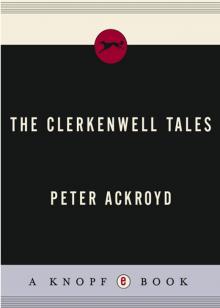 The Clerkenwell Tales
The Clerkenwell Tales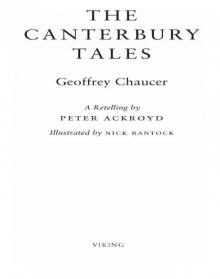 The Canterbury Tales
The Canterbury Tales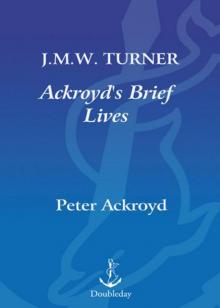 J. M. W. Turner
J. M. W. Turner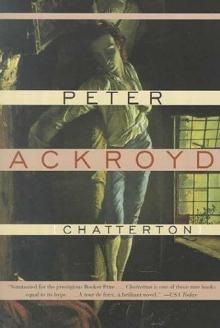 Chatterton
Chatterton The Canterbury Tales – A Retelling
The Canterbury Tales – A Retelling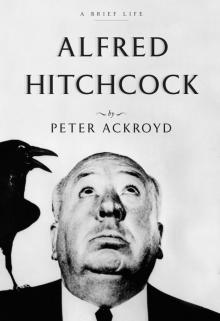 Alfred Hitchcock
Alfred Hitchcock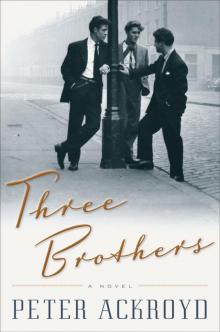 Three Brothers
Three Brothers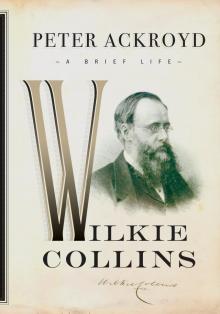 Wilkie Collins
Wilkie Collins Venice
Venice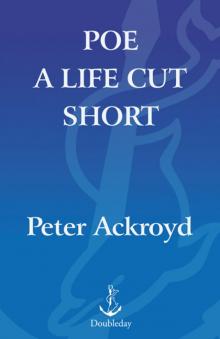 Poe
Poe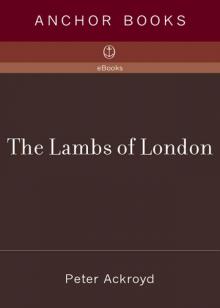 The Lambs of London
The Lambs of London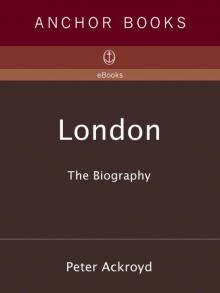 London
London Queer City
Queer City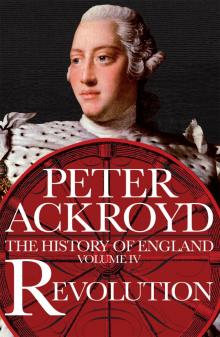 Revolution, a History of England, Volume 4
Revolution, a History of England, Volume 4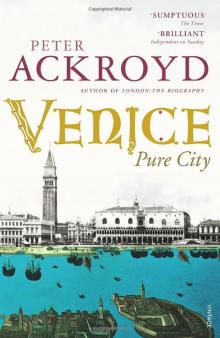 Venice: Pure City
Venice: Pure City Foundation
Foundation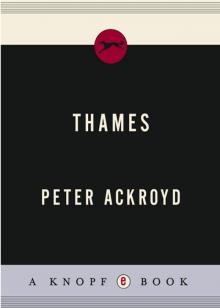 Thames
Thames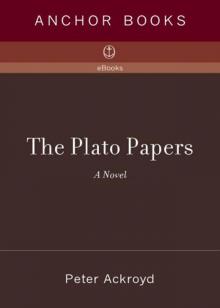 The Plato Papers
The Plato Papers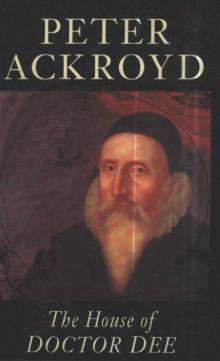 The house of Doctor Dee
The house of Doctor Dee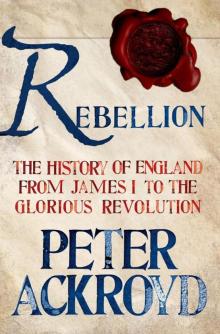 Rebellion: The History of England from James I to the Glorious Revolution
Rebellion: The History of England from James I to the Glorious Revolution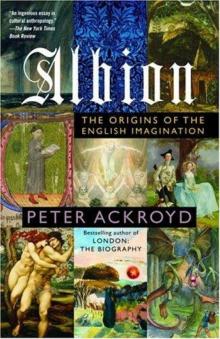 Albion: The Origins of the English Imagination
Albion: The Origins of the English Imagination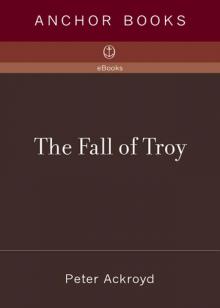 The Fall of Troy
The Fall of Troy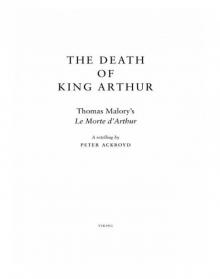 The Death of King Arthur
The Death of King Arthur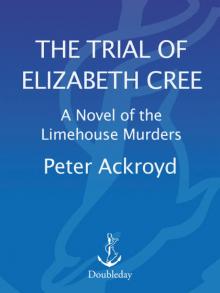 The Trial of Elizabeth Cree
The Trial of Elizabeth Cree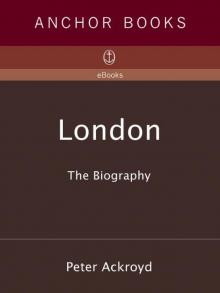 London: The Biography
London: The Biography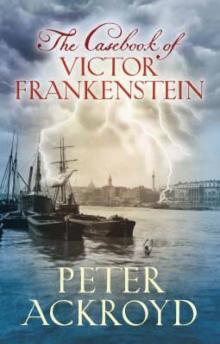 The Casebook of Victor Frankenstein
The Casebook of Victor Frankenstein Hawksmoor
Hawksmoor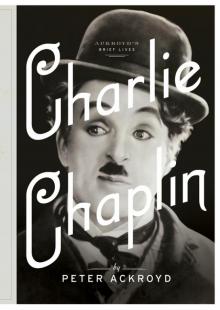 Charlie Chaplin
Charlie Chaplin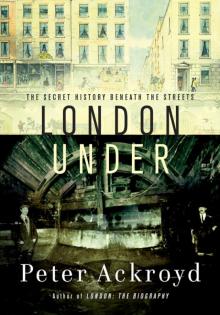 London Under
London Under